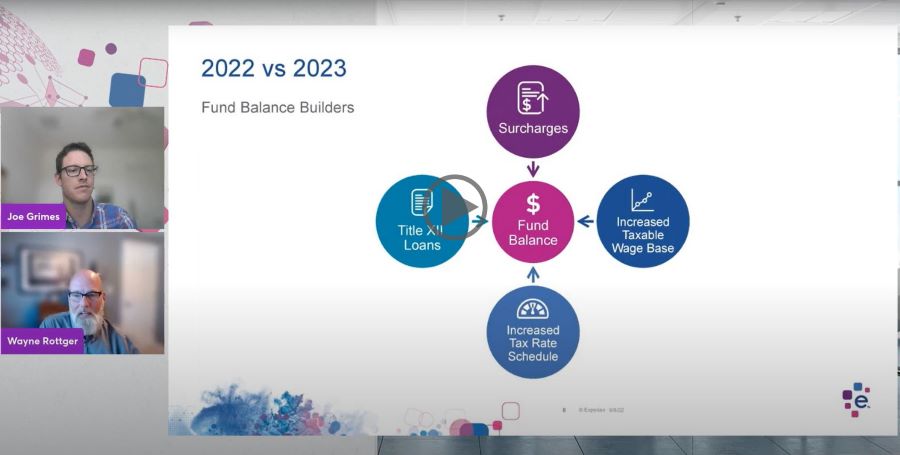Do you ever wish you could predict the future? Unemployment Rate Projections are about as close as you can get to predicting your future unemployment insurance (UI) costs, but the COVID-19 pandemic changed the unemployment tax landscape. Experian Employer Services unemployment tax experts Wayne Rottger, Vice President of Tax and Joe Grimes, Director of Incentives, will provide insight into how to adapt the process of projecting your future UI tax rate. They will also cover benefits to organizations who review and budget based on the projections that can be provided by the Experian Employer Services Unemployment Tax Department.
The following is an excerpt from the webinar on forecasting your UI tax rate. Watch the full version here.
Joe Grimes: So today we will be going over a handful of items. First off we’ll focus on what we know today being just over halfway through 2022, and then next we will do a comparison of what we expect to see in the upcoming calendar year for Unemployment Insurance taxes and benefits. Third we will talk about the different factors with UI and how those may be impacted by employers. Next we will talk about the different data that is necessary in order to conduct UI tax rate forecasting, and then we will wrap it up from there.
Wayne Rottger: All right thanks Joe, so we’ll jump right in. Today, in 2022, it’s in the news a lot. You probably have heard something called the total unemployment rate or the national unemployment rate. As of July of this year that was at 3.5. The average for 2021, just to give you some comparison there, was 5.3 percent, and the highest in 2021 was 6.4. So you know we’re trending downward and it does look better, but we do still have a lot of room to get lower than that, even to where it was prior to COVID-19 and the pandemic.
Federal Title 12 loans are a real hot topic right now because, as you probably know, those have to be repaid by a certain date and if they’re not, then the employer will be stuck with additional taxes on their Form 940 for next year. So to give you some comparison, for numbers in 2010 that was when the last major recession took place and there were outstanding Federal title 12 loans to the tune of about 40 billion. Then we moved forward to 2019 where there were was only the Virgin Islands, and due to the hurricane they had an outstanding title problem. But as of this month there are seven states or territories, Virgin Islands being that one territory, that have an outstanding loan. Five of those may not be able to repay that before the deadline this year, so we’ve got California, Illinois, Massachusetts, New York, and Virgin Islands. Of those five California has the largest amount that they have to repay, and I don’t honestly think California will be the one to be most closely watched for this year because it’s doubtful unless something really major happens, maybe congressional or something like that, that gets put into place. California, as you might remember, was the last state to pay off its Federal loans the last time, and I want to say that was within the last four or five years. It’s not been terribly long so it did take them quite a while to get that paid off and so you know during that whole time then employers are having to pay that money to get that loan paid off, so it behooves employers to be aware of this so that they can forecast in the coming year, or the upcoming years, what the additional tax expense from their UI tax rate might be for the upcoming years.
